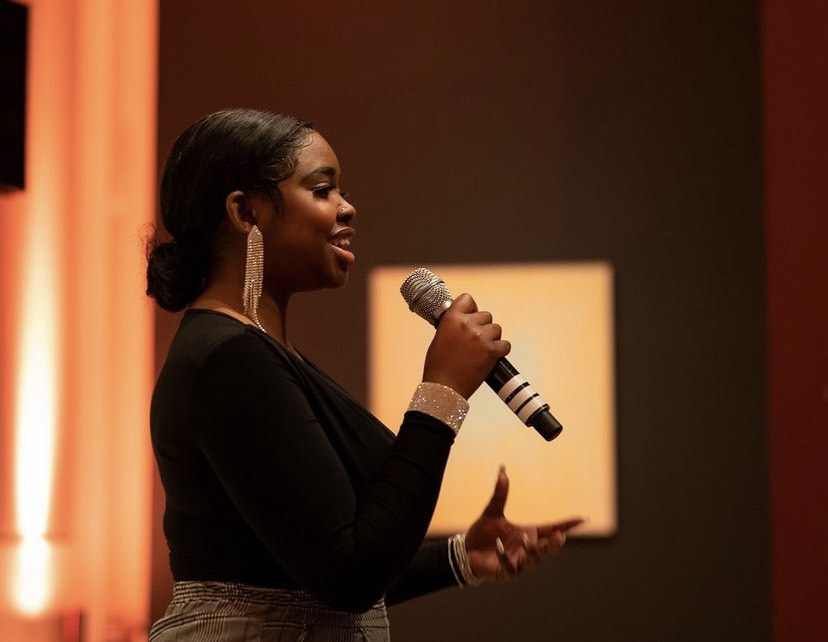
Could you first introduce yourself to the reader?
I go by the stage name of Dialectic Dee, and I am a 24 year old spoken word artist, sickle cell advocate and poetry workshop facilitator from London. I am 1/5 of Mantra music.
During the week I work with the Rio Ferdinand Foundation as a creative lead youth worker and do freelance work with other art and poetry organisations.
What does your job involve? Give us the typical outline of a day?
In the morning I tend to do any admin work which needs to be done for any creative projects which I’m currently working on or respond to any bookings/ email enquiries. In the evenings I do creative poetry sessions at youth clubs or in community centres across London with young people.
What’s great about your job?
I get to engage with a multitude of very talented and super creative young people every single day, no two sessions are ever the same and I love that! My role is also super interactive and sociable so I am constantly in my element and feel like I can put my strengths, knowledge, skillset and industry experience to good use as well as learn new things from the participants who partake in my workshops. I have always dreamed of doing poetry as a full-time career and my job allows me to do that!
What are the bits you don’t like or find challenging?
Sometimes I have to travel far distances as our sessions are all over London so my journey to and from work can be quite draining sometimes and you have to be open and flexible to last minute changes.
What are the highlights of your career to date?
My greatest achievements to date include releasing my debut EP ‘Utter Confusion’, being invited to perform my poetry in Finland at a poetry festival, signing to Mantra Music and doing my spoken word/ having my work featured in an #IAmJD Christmas commercial .
You released your debut EP, Utter Confusion, last year. You’ve described it as a very raw and vulnerable recording, Tell us about the album.
‘Utter Confusion’ combines spoken word poetry with trap soul instrumentals. The EP delves deeply into the two key themes of situationships and heartbreak. Musically the EP explores the idea of two contrasting genres coming together, to represent the two different sides of the story, the two different individuals/characters involved in this situationship, and the fact that they want different things out of it. This unravels in the poetic storytelling nature of this EP. The project takes the shape of a narrative conceptual EP in which the events being spoken about take place over a period of time. The EP is a summary of 7 tracks and one interlude.
What was your actual experience of recording the EP? Was it what you expected? What are your plans for a follow-up?
Recording and writing the EP was very challenging as I had never worked with music in this capacity or on a conceptual body of work before over multiple months, so I had to tap into a new mode and a new way of creating. In comparison to writing and performing for stage making an EP has so many different elements to it: writing, editing, structuring, decision making, recording, mixing & mastering, finalising, promotion, press coverage… It definitely pushed me outside of my comfort zone and encouraged me to look at the whole artistic process rather than honing in on one small part of it.
You’re signed with Mantra Music, a record label that seeks to boost the voices of care experienced artists. How do they support you in your artistic endeavours?
Mantra music has supported me to professionally produce and fund two new singles and a music video which I’m still in the process of working on. For me this is very exciting, as since the release of my EP I have been quite quiet in regards to dropping and releasing new content, and I have never released a poetry visual before. However I do know the importance of having accessible material online, as the online space is a community within itself and that is how your work reaches more people so that you can get more bookings and travel beyond borders.
They have also helped me to get my first professional press shots done, and we are currently in the process of working on a documentary which captures our experience of the care system and our personal journey and growth as artists.
I have also been introduced to a lot of new industry professionals across all different realms and artistic backgrounds since working with Mantra.
Mantra Music has provided me with a lot of hope as an artist and as a care leaver. It has shown me that there is support, care and community available within an industry that often lacks these qualities, you just have to look for it and be open to receiving it.
Why do you think there is a lack of representation from care experienced artists in the music industry? What can be done to tackle it?
I think it could be due to the fact that we are so under-represented that we are unsure as to how our stories and narratives could exist in such a glamourised industry. However, I do think it all starts with claiming and owning your story and not being ashamed of your truth, and instead finding a way to understand it and make sense of it, and if you choose to process it through art then all the better – art often acts as the vessel for people who may never understand our truth but want to gain some insight into it.
If we don’t put ourselves on the map that segment of our journey will continue to go unnoticed and people will continue to be ignorant to the fact that there is a missing narrative or a gap in the industry. If we don’t act as a voice for the voiceless no one ever will, but it is also up to us to choose whether or not we feel the need or want to do so, and see value in doing so.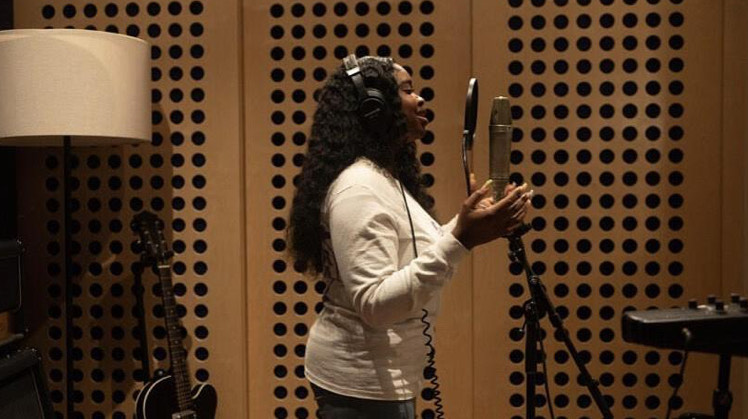
As a poet, how do you approach writing? Is there a particular workflow or source of inspiration you gravitate towards?
I usually approach writing or find themes to write about through connecting with my own personal experiences and situations, and by taking part in creative writing workshops or being surrounded by other writers and creatives. I often find that when there is an artistic source provided – whether that be a poetry exercise, quote, prompt or image – and an allocated space and time it often pushes me to create my most artistic work.
In terms of my sources of inspiration, my main creative influences would have to be Sophia Thakur, Little Simz, Enny and Mahalia – they all have artistic traits that I admire relentlessly. Sophia was the first poet I ever watched after discovering her on YouTube. Her work inspired me so much that it pushed me to start writing my own poetry. Before then I didn’t even know that spoken word as an art form even existed. She completely shifted my perspective of what poetry is and could be.
How much has your experience in the care system influenced your work?
At first I found it really difficult to write about my experiences as I felt a huge disconnect, and I felt like there was a lot of unknown information and questions I didn’t have the answers to, but ever since I found a way in to writing about the parts of my story that Ido know, so many doors have opened for me. My poem Jenga, which talks about the care system as a whole and my journey in comparison to my birth siblings' experiences, and our contrasting realities, still gets me the most paid bookings to date and has taken me to some crazy heights, and provided me with some incredible opportunities.
What is a misconception about the care system you’d like to challenge?
We always see the same stories of the care system reflected in the media, and the same characters created each time similar to those of Tracy Beaker and Annie, and although this is true to some individual’s realities, not every individual has a bad experience. Some actually turn out to have a great experience from the very beginning of being fostered/adopted.
How did you get into an arts job? Have you also worked outside the arts?
I got into an arts job by being persistent since graduating from drama school. It didn’t happen straight away as poetry is a very niche sector, and the scene here in the UK is still growing, so sometimes I feel as if poets are overlooked and not taken seriously in regards to paid work, bookings, shows and gigs.
With facilitation work for poets being far and few, and projects usually only lasting a few weeks or on a more freelance basis, carving out a career in the artform is hard, however I didn’t want to let that stop me from pursuing it as an option. My love for facilitating workshops sparked from studying community arts practice at The Brit School and then going on to study a BA in Performance & Creative Enterprise at The Guildhall School of Music and Drama. When I first graduated I worked as a teaching assistant via an education agency whilst freelancing on the side and in the evenings until I landed my current job.
Can you describe your biggest challenge so far in your career? How did you overcome it? Have you noticed any changes in the industry? If so, what?
I would definitely say that the path to becoming an artist has certainly not been straightforward, and at times it has most definitely been challenging!
A common challenging factor for me is when I have a lack of inspiration or writer's block, however I do tend to find that I work better in workshops and group settings from time to time, and eventually produce work that is more original and ‘outside the box’. In short, I am definitely a creative social butterfly and feed off of other energies in the room, so joining Mantra and being a part of a collective has definitely helped me a lot.
Another thing that can be quite challenging is when I have an idea I want to execute but I just don’t know the steps I need to take in order to bring it to life, or I don’t have the resources or financial income in order to do so – which Mantra has also been able to help with quite a lot.
When I have reoccurring issues with my health and sickle cell, I know that it can definitely play a huge toll on my level of productivity and progress.
After graduating from drama school and when Covid hit, it has at times definitely been more difficult to find motivation to keep going with my art, and to find ways to persist due to the lack of consistent paid opportunities and access to creativity .
You’ve been granted the ability to send a message to a 16-year-old you. What do you say?
Never allow anyone to tell you you’re too young to chase your dreams or to be a poet. Never allow anyone to try and silence you or to try and stop you from voicing your truth – your story matters, your experiences are valid. Never allow anyone to dim your luminous glowing light, shine so brightly it burns their eyes. Never doubt the magic within your ability and the power within your purpose, God has gifted you with this blessing of an art form for a reason.
Do you have any advice for young people interested in doing your kind of work?
You can do anything you put your mind to. Don’t allow people to tell you otherwise, or make you feel as if you don’t belong, or try to make you think that poetry is only for a certain audience or can only be in a certain style or about a certain topic
Poetry is embedded within our everyday lives and even though we may not realise it at times, rarely are we wordless. We use language so frequently, everyone has their own train of thought and therefore has something to say.
It's just about whether or not we find the courage to own it and to embody it.
Where can people find out more about you and your work?
You can find out more about me and my work via my social media pages which are all @dialecticdee.
Be sure to keep an eye out for all of my upcoming projects and releases which should be out later this year

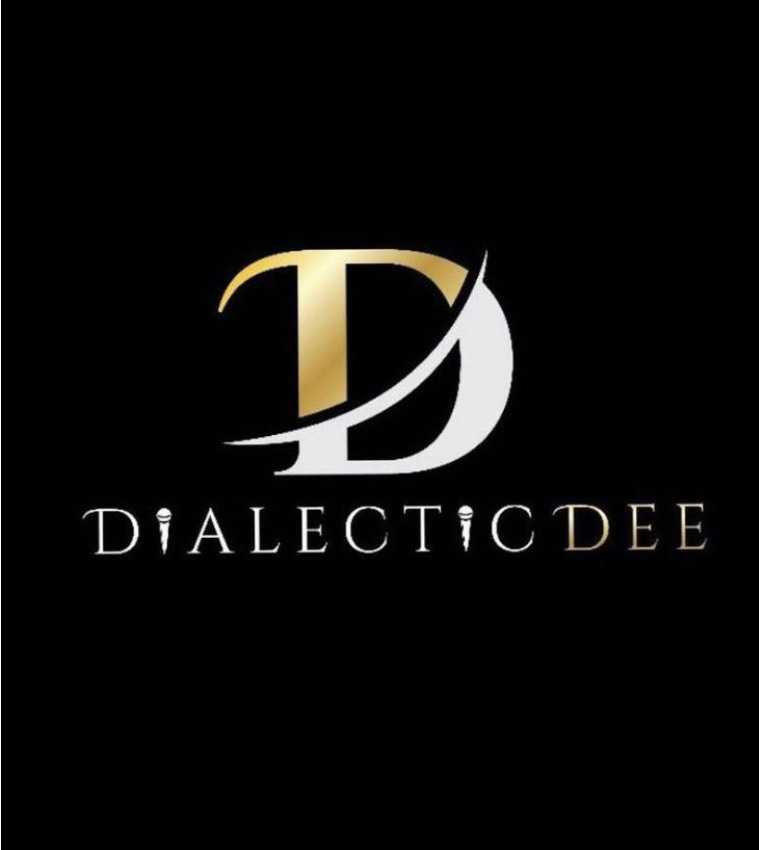




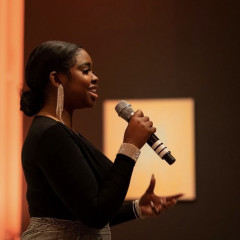

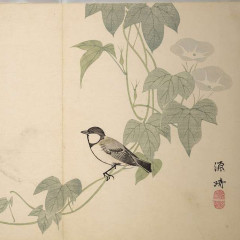
0 Comments